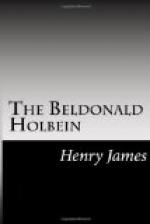The famous “irony of fate” takes many forms, but I had never yet seen it take quite this one. She had been “had over” on an understanding, and she wasn’t playing fair. She had broken the law of her ugliness and had turned beautiful on the hands of her employer. More interesting even perhaps than a view of the conscious triumph that this might prepare for her, and of which, had I doubted of my own judgement, I could still take Outreau’s fine start as the full guarantee—more interesting was the question of the process by which such a history could get itself enacted. The curious thing was that all the while the reasons of her having passed for plain—the reasons for Lady Beldonald’s fond calculation, which they quite justified—were written large in her face, so large that it was easy to understand them as the only ones she herself had ever read. What was it then that actually made the old stale sentence mean something so different?—into what new combinations, what extraordinary language, unknown but understood at a glance, had time and life translated it? The only thing to be said was that time and life were artists who beat us all, working with recipes and secrets we could never find out. I really ought to have, like a lecturer or a showman, a chart or a blackboard to present properly the relation, in the wonderful old tender battered blanched face, between the original elements and the exquisite final “style.” I could do it with chalks, but I can scarcely do it with words. However, the thing was, for any artist who respected himself, to feel it—which I abundantly did; and then not to conceal from her I felt it—which I neglected as little. But she was really, to do her complete justice, the last to understand; and I’m not sure that, to the end—for there was an end—she quite made it all out or knew where she was. When you’ve been brought up for fifty years on black it must be hard to adjust your organism at a day’s notice to gold-colour. Her whole nature had been pitched in the key of her supposed plainness. She had known how to be ugly—it was the only thing she had learnt save, if possible, how not to mind it. Being beautiful took in any case a new set of muscles. It was on the prior conviction, literally, that she had developed her admirable dress, instinctively felicitous, always either black or white and a matter of rather severe squareness and studied




